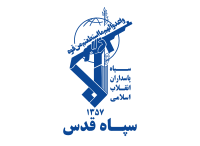
Back Koeds-mag Afrikaans فيلق القدس Arabic Qüds qüvvələri Azerbaijani قودس گوجو AZB Кодс Byelorussian Nerzhioù Al-Qods Breton Força Quds Catalan ھێزی قودس CKB Jednotky Quds Czech Quds-Einheit German
| Quds Force | |
|---|---|
| Founded | 1988 as an independent force |
| Country | |
| Type | Special operations force |
| Role | Extraterritorial operations, Unconventional warfare, Military Intelligence |
| Size | 5,000[1] |
| Part of | |
| Engagements | |
| Commanders | |
| Current commander | Brig. Gen. Esmail Qaani |
| Deputy Commander | Brig. Gen. Mohammad Reza Fallahzadeh[2] |
| Insignia | |
| Flag |  |
| Alternative Flag |  |
The Quds Force (Persian: نیروی قدس, romanized: niru-ye qods, lit. 'Jerusalem Force') is one of five branches of Iran's Islamic Revolutionary Guard Corps (IRGC)[3] specializing in unconventional warfare and military intelligence operations. U.S. Army's Iraq War General Stanley McChrystal describes the Quds Force as an organization analogous to a combination of the CIA and the Joint Special Operations Command (JSOC) in the United States.[4] Responsible for extraterritorial operations,[5] the Quds Force supports non-state actors in many countries, including Hezbollah, Hamas, Palestinian Islamic Jihad, Yemeni Houthis, and Shia militias in Iraq, Syria, and Afghanistan.[5] According to Michael Wigginton et al., the Al-Quds Force is "a classic example of state-sponsored terrorism."[6]
The Quds Force reports directly to the Supreme Leader of Iran, Ayatollah Khamenei.[7][8] After Qassem Soleimani was assassinated in a U.S. drone strike, his deputy, Esmail Ghaani, replaced him.[9] The U.S. Secretary of State designated the Islamic Revolutionary Guard Corps and Quds Force as a Foreign Terrorist Organization (FTO) in 2019 based on the IRGC's "continued support to and engagement in terrorist activity around the world." This was the first time that the U.S. ever designated another government's department as a FTO.[10]
- ^ Cordesman & Kleiber 2007, p. 78.
- ^ "Who Is Mohammad Reza Fallahzadeh, the New Deputy Commander of Iran's Qods Force?". The Washington Institute. Archived from the original on 28 May 2023. Retrieved 27 July 2023.
- ^ Kamrava, Mehran, ed. (2020). "The Armed Forces in Post-revolutionary Iran". Routledge Handbook of Persian Gulf Politics. Routledge. ISBN 9780429514081.
- ^ McChrystal, Stanley. "Iran's Deadly Puppet Master". Foreign Policy. Archived from the original on 2 June 2023. Retrieved 7 January 2020.
- ^ a b Operational Environment Assessment (OEA) Team (April 2010). "Operational Environment Assessment: Iran". Ft. Leavenworth, KS: TRADOC Intelligence Support Activity (TRISA)-Threats, US Army. Archived (PDF) from the original on 27 July 2023. Retrieved 27 July 2023.
 This article incorporates public domain material from websites or documents of the United States Army.
This article incorporates public domain material from websites or documents of the United States Army.
- ^ Wigginton et al. 2015, p. 153.
- ^ Dionisi 2006, p. 7.
- ^ "Iran demands nationals' release". BBC News. 14 January 2007. Archived from the original on 19 January 2007. Retrieved 14 February 2007.
- ^ Cunningham, Erin; Hendrix, Steve (22 February 2020). "Iran's Revolutionary Guard Corps wrestles with new reality after killing of its chief military strategist". Washington Post. Archived from the original on 7 December 2022. Retrieved 27 July 2023.
- ^ Country Reports on Terrorism 2019 (PDF) (Report). United States Department of State. Archived (PDF) from the original on 11 November 2021. Retrieved 27 July 2023.
© MMXXIII Rich X Search. We shall prevail. All rights reserved. Rich X Search